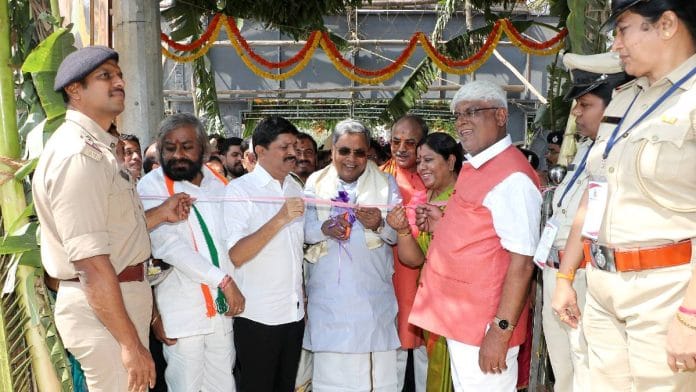Bengaluru: Karnataka Chief Minister Siddaramaiah appears to have come full circle with his spiritual journey, starting off with known associations with the village temple, to revealing rationalist and agnostic leanings, and finally becoming a “believer” once again.
In the last few days, the 75-year-old Congress leader has made his religious inclinations clear by declaring that he too is a “believer” of the Hindu deity Ram.
On Monday, as Prime Minister Narendra Modi led the pran pratishtha ceremony of Ram Lalla in Ayodhya’s newly-built Ram temple, Siddaramaiah inaugurated a temple dedicated to Ram, Sita and Lakshman — according to the Hindu tradition — in Bengaluru’s Mahadevapura.
A picture of the CM sporting a black teeka on the forehead with a picture of Ram in the background has been doing the rounds of social media.
“I am not an atheist — I am a believer. I have built a temple of Ram in my village,” Siddaramaiah told reporters after the event. He iterated Kannada poet Kuvempu’s words hailing the state as “sarvajangada shanthiya thota (a garden of peace for all races and castes)” and called it an embodiment of the ideals of Ram.
To those who have known Siddaramaiah from the late 1970s, this was nothing short of a revelation.
Speaking to ThePrint, a person who has known Siddaramaiah well said he was more influenced by 12th-century social reformer Basavanna. The CM is also known to revere Sree Sree Sree Shivakumara Swami of Siddaganga Mutt and has close affiliation with Suttur Mutt — two of the most prominent spiritual centres of the dominant Lingayat community in Karnataka. “But this (his mutt association) was more to do with the social work these mutts were practising like providing free education,” said the person.
K. Arkesh, a former IPS officer who has been a friend of Siddaramaiah since the 1970s, told ThePrint: “He was not committed one particular religion… he was not so religious in nature. Not that he didn’t believe in the existence of God but he was not known to frequently visit temples wearing a tilak on his forehead… we had never seen that.”
The former civil servant said Siddaramaiah was known more as an agnostic than as an atheist.
Other people closely associated with Siddaramaiah also said that the two-time CM’s new-found spirituality was likely to be more political to counter constant barbs from the rival Bharatiya Janata Party (BJP), which has time and again termed him “anti-Hindu”.
“Ever since he became chief minister (in 2013) and then the Leader of the Opposition, there appears to be a change in him regarding the practice of going to temples and performing aarti… that itself is a transformation,” P.G.R. Sindhia, a former minister who has known Siddaramaiah since 1977, told ThePrint.
As Siddaramaiah navigates his political landscape, he faces numerous challenges, including allegations of corruption that have been levied against him. These accusations have sparked discussions about the integrity of his administration and the implications of his political maneuvers in the context of Karnataka’s governance.
Also Read: From shepherd to Karnataka chief minister, again — a look at Siddaramaiah’s political journey
Rationalist, anti-superstition
From his early days, Siddaramaiah had come in contact with people with socialist leanings, according to people close to him.
His mentor, professor M.D. Nanjundaswamy, perhaps influenced him the most. He was also associated with other socialist thinkers in Karnataka like P. Mallesh, professor Ramdas, Devanoor Mahadeva and P. Lankesh, among others, they said.
In possibly his first interview as CM in 2013, then senior journalist (and now his media secretary) K.V. Prabhakar had asked Siddaramaiah about his belief in god and religion.
In that interview to a panel of journalists from Suvarna News channel and Kannada Prabha newspaper, Siddaramaiah had said his wife and family were religious but he rarely took part in any of it.
Even during his time as a temple goer at his native village of Siddaramanahundi in Mysuru, people who have known Siddaramaiah said the phase was more “cultural” rather than a result of his affinity towards religion.
In 2022, a video of Siddaramaiah dancing at a temple fair had gone viral.
The person cited above said that Siddaramaiah was more a rationalist who also did not dispel the notion of the existence of god.
In 2017, the Siddaramaiah-led Congress government had pushed for the Karnataka Prevention and Eradication of Inhuman Evil Practices and Black Magic Bill or “anti-superstition” Bill.
Surrounded by pious legislators and ministers, Siddaramaiah is often a lone voice against superstition, especially the practice of consulting with astrologers.
His former mentor-turned-rival H.D. Deve Gowda is known to consult with astrologers for almost all aspects of his public and private life. “He did not believe in it but never questioned Gowda,” Sindhia said.
(Edited by Nida Fatima Siddiqui)






